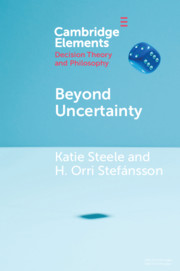8 results
Transformative Experience, Awareness Growth, and the Limits of Rational Planning
-
- Journal:
- Philosophy of Science / Volume 89 / Issue 5 / December 2022
- Published online by Cambridge University Press:
- 10 June 2022, pp. 939-948
- Print publication:
- December 2022
-
- Article
- Export citation

Beyond Uncertainty
- Reasoning with Unknown Possibilities
-
- Published online:
- 14 August 2021
- Print publication:
- 09 September 2021
-
- Element
- Export citation
What Should We Agree on about the Repugnant Conclusion?
-
- Article
-
- You have access
- Open access
- HTML
- Export citation
The Diversity of Model Tuning Practices in Climate Science
-
- Journal:
- Philosophy of Science / Volume 83 / Issue 5 / December 2016
- Published online by Cambridge University Press:
- 01 January 2022, pp. 1133-1144
- Print publication:
- December 2016
-
- Article
- Export citation
Can Free Evidence Be Bad? Value of Information for the Imprecise Probabilist
-
- Journal:
- Philosophy of Science / Volume 83 / Issue 1 / January 2016
- Published online by Cambridge University Press:
- 01 January 2022, pp. 1-28
- Print publication:
- January 2016
-
- Article
- Export citation
The Scientist qua Policy Advisor Makes Value Judgments
-
- Journal:
- Philosophy of Science / Volume 79 / Issue 5 / December 2012
- Published online by Cambridge University Press:
- 01 January 2022, pp. 893-904
- Print publication:
- December 2012
-
- Article
- Export citation
Preference and Information, Dan Egonsson. Ashgate, 2007, xi+163 pp.
-
- Journal:
- Economics & Philosophy / Volume 25 / Issue 2 / July 2009
- Published online by Cambridge University Press:
- 01 July 2009, pp. 236-242
-
- Article
- Export citation

